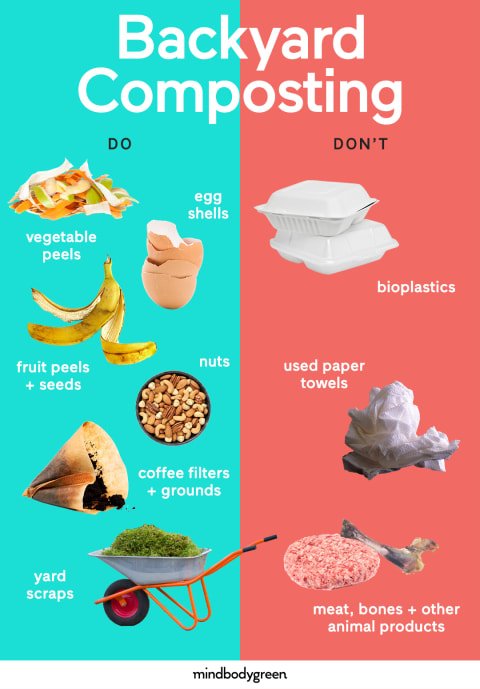What's the Dirt on Composting?
Compost. Photo by Gardening Know How.
Last blog post, we discussed the far-reaching harm of food waste, and how one way we can decrease food waste is by composting. Composting is one of the best things we can do with our food waste, because instead of sending our food to a landfill where it won't be able to break down properly, composting gives our food waste a second life.
What is compost?
Compost is a “nutrient-rich, soil-like material comprised of decomposing organic matter—most often made up of fallen leaves, grass clipping, plant debris, vegetable scraps, and yard waste.” Composting allows these organic materials to return to the earth, and then the compost can be used to help plants grow. It is a significant player not only in decreasing food waste, but in regenerative agriculture as a whole.
Why is composting important?
Compost Infograph. Photo by Institute for Local Self-Reliance.
Composting reduces our waste stream. According to the Institute for Local Self-Reliance, over 50% of waste in a typical municipal waste garbage bag is compostable. By composting this organic waste, we are giving it a second life instead of sending it to the landfill.
Reduces methane emissions from the landfill. When food waste is buried in a landfill, it is not able to receive oxygen and therefore it can't properly decompose. This failure to break down releases methane gas, which is a harmful greenhouse gas. Less food waste in a landfill means less methane emissions!
Plants love compost. Not only is it rich in nutrients, but compost is known as the "great equalizer" amongst farmers. This is because compost is able to fix any soil problem, such as too sandy soil or hard clay soil.
Decreases erosion. Compost helps soil hold more moisture, which means less irrigation is needed. This decreases the amount of soil lost to wind and erosion. Nearly 33% of the world's farmable land has been lost due to erosion, so composting can decrease the amount lost in the future.
How do you compost?
Deciding the best way to compost can be dependent on your available space. If you have a backyard, then you can try hot composting, cold composting, or vermicomposting. However, if you live in an apartment or don’t have the space or ability to create a backyard compost pile, there are still ways to compost! You can try apartment vermicomposting or check out the City of Knoxville's pilot compost project. Take their quiz to see what you can compost, and then take your accepted food waste to the recycling center in the Old City. The food waste will be donated to BattleField Farms, where it will be turned into compost and used to help grow healthy and yummy food for Knox County residents!
What can be composted?
You can compost these items in your at-home compost pile. For what can be composted with the City of Knoxville, please check their website.
Composting Dos and Don’ts. Photo by Mind Body Green.
Vegetables
Fruit
Grass clippings
Fallen leaves
Coffee grounds
Egg shells
House plants
Shredded newspaper
Hair and fur
What can't be composted?
Animal bones
Meat scraps
Pet waste
Dairy products (milk, cheese, yogurt, etc.)
Grease
Further Resources:



